To Be Where You Are Read online
MITFORD BOOKS BY JAN KARON
At Home in Mitford
A Light in the Window
These High, Green Hills
Out to Canaan
A New Song
A Common Life
In This Mountain
Shepherds Abiding
Light from Heaven
Home to Holly Springs
In the Company of Others
Somewhere Safe with Somebody Good
Come Rain or Come Shine
Esther’s Gift:
A Mitford Christmas Story
The Mitford Snowmen:
A Christmas Story
Jan Karon’s Mitford Cookbook & Kitchen Reader:
Recipes from Mitford Cooks, Favorite Tales from Mitford Books
The Mitford Bedside Companion:
New Essays, Family Photographs, Favorite Mitford Scenes, and Much More
FATHER TIM’S COLLECTED QUOTES
Patches of Godlight:
Father Tim’s Favorite Quotes
A Continual Feast:
Words of Comfort and Celebration, Collected by Father Tim
CHILDREN’S BOOKS BY JAN KARON
Jeremy:
The Tale of an Honest Bunny
Miss Fannie’s Hat
The Trellis and the Seed:
A Book of Encouragement for All Ages
G. P. PUTNAM’S SONS
Publishers Since 1838
An imprint of Penguin Random House LLC
375 Hudson Street
New York, New York 10014
Copyright © 2017 by Jan Karon
Penguin supports copyright. Copyright fuels creativity, encourages diverse voices, promotes free speech, and creates a vibrant culture. Thank you for buying an authorized edition of this book and for complying with copyright laws by not reproducing, scanning, or distributing any part of it in any form without permission. You are supporting writers and allowing Penguin to continue to publish books for every reader.
“When They Sleep” by Rolf Jacobsen, translation by Robert Hedin, from The Roads Have Come to an End Now: Selected and Last Poems of Rolf Jacobsen (Copper Canyon Press, 2001). Translation reprinted by permission of Robert Hedin.
Library of Congress Cataloging-in-Publication Data
Names: Karon, Jan.
Title: To be where you are / Jan Karon.
Description: New York: G. P. Putnam’s Sons, [2017] | Series: A Mitford novel; 14
Identifiers: LCCN 2017026335 (print) | LCCN 2017030276 (ebook) | ISBN 9780399183751 (ePub) | ISBN 9780399183737 (hardcover)
Subjects: LCSH: Kavanagh, Timothy (Fictitious character)—Fiction. | Mitford (N.C. : Imaginary place)—Fiction. | Episcopalians—Fiction. | Clergy—Fiction. | Marriage—Fiction. | Weddings—Fiction. | Domestic
fiction. | BISAC: FICTION / Family Life. | FICTION / Christian / General. | FICTION / Contemporary Women. | GSAFD: Christian fiction.
Classification: LCC PS3561.A678 (ebook) | LCC PS3561.A678 T63 2017 (print) | DDC 813/.54—dc23
LC record available at https://lccn.loc.gov/2017026335
This is a work of fiction. Names, characters, places, and incidents either are the product of the author’s imagination or are used fictitiously, and any resemblance to actual persons, living or dead, businesses, companies, events, or locales is entirely coincidental.
Version_1
For my mother
1921–2016
CONTENTS
Map of Mitford
Mitford Books by Jan Karon
Title Page
Copyright
Dedication
Chapter 1
Chapter 2
Chapter 3
Chapter 4
Chapter 5
Chapter 6
Chapter 7
Chapter 8
Chapter 9
Chapter 10
Chapter 11
Chapter 12
Chapter 13
Chapter 14
Chapter 15
Chapter 16
Chapter 17
Chapter 18
Chapter 19
Chapter 20
Chapter 21
Chapter 22
Chapter 23
Chapter 24
Chapter 25
Acknowledgments
About the Author
1
MITFORD
THURSDAY, OCTOBER 1
It was the first day of October, and all things considered, Mitford was pretty quiet.
Around the tenth of the month is when it would hit the fan. The chlorophylls of summer foliage would have degraded into nonfluorescent chlorophyll catabolites, and hidden pigments would explode in a pyrotechnic extravagance of scarlet, gold, vermilion, and out-loud yellow.
While the display would be rampant throughout the Blue Ridge Mountains, Mitford was proud to offer its very own autumn expo:
A brace of mature Acer rubrum, which paraded from Town Hall to First Baptist. Such annual spectacle would not be missed by tourists in the thousands, steaming up the mountain with the ubiquitous cell phone and occasional Nikon.
There was, however, a caveat. There were now two gaps in the parade of maples. One where lightning had struck in 2005 and the other where trunk rot had finally dealt its fatal blow.
The Council had ordered the stump ground and the vacant sites disguised with mulch. Mitford had not enjoyed a furor in quite a while and somehow, collectively, had decided the time had come.
A party of locals demanded that the maples be replaced, full-size, which would cost the town a bundle. Others campaigned to replant with beds of pansies, historically known as the town flower. A group calling themselves the Vocal Locals objected to pine bark mulch as too acidic for the soil and pressed for cocoa bean hulls, which others rejected outright as ‘too foreign.’
Esther Cunningham’s copy of the weekly Muse hit the porch at seven-thirty sharp; she read the feature on the trees while cranked back in her recliner.
She hadn’t served as Mitford’s mayor, albeit former, for nothing. She knew about such things. People were right about th’ pine bark—get it offa there and go with th’ pansies. How often did they get a blank spot to drop in a couple flats of pansies? As for replacement, no. Nobody in their right mind would go for the cost of spading in mature trees, and young stock would look ridiculous among their elders.
After sixteen nose-to-the-grindstone years, she’d been retired for how long? Too long! She had sworn never to run for office again, but didn’t people change their minds all the time and so what if she was gaining on ninety?
Take th’ woman in England who was a hundred and still tend-in’ bar—pullin’ pints, she called it, three days a week. And that hundred-year-old gal writin’ for a newspaper, askin’ people, Got any news?
And how about th’ mayor who was still mayorin’ at a hundred an’ two, bless ’er heart? Just lately, she dropped dead comin’ out of a council meeting, which was no surprise. How many of those monkey shows had she, Esther Cunningham, barely escaped with her life?
She located the remote in the pocket of the recliner, cranked upright, and reached for her iPad.
Havin’ an iPad had opened a whole new world. Her daughters could no longer accuse her of bein’ Stone Age; she knew what was goin’ on out there with people livin’ longer.
• • •
At seven thirty-five, Father Tim Kavanagh dropped a frozen banana, half a package of frozen acai berries, and a handful of
frozen mangoes and peaches into a blender. The mélange was followed by a container of Greek yogurt, a spoonful of tahini, and a long pour of almond milk.
He hit the Blend button while firmly holding down the lid. Completely new to the smoothie regimen, he was alarmed by the possibility of the lid flying off and splattering stuff all over the kitchen. But the blender wouldn’t blend. It sounded like an eighteen-wheeler spinning tires on a sheet of ice.
He hit Off and reviewed the options.
Puree, Whip, Mix, Stir, Grind, Frappé.
Grind did not work. Same with the other options.
Okay, so some of the contents were frozen like a rock; maybe they had to partially thaw. When the nurse gave him the recipe after his physical, she didn’t say the ingredients had to be thawed. He did not have time to wait for something to thaw. He hit Blend again. A sound like tires screaming on a NASCAR track.
This would be his first morning without caffeine. Whether he could live up to the caffeine-free regimen recommended by Dr. Wilson, he couldn’t say. He was totally hooked on coffee and had been for decades. Cut him some slack, for Pete’s sake. Let him cling to this harmless vice.
He removed the lid and looked in. Maybe if he stuck a knife down in there and broke up the frozen chunks . . .
So, okay, you cannot put in big chunks, they have to be broken up first, because that worked pretty well and now the blender was sort of blending. This smoothie business was no walk in the park. He’d had trouble opening the package of frozen acai berries and resorted to sawing through the wrapper with a bread knife. Acai berries, whey, tahini—such exotic items were not available at the Local; he’d been forced to drive to the neighboring Wesley, a college town in which such products thrived.
He emptied the contents of the blender into a large glass for himself and one for Cynthia, who would be coming downstairs any minute, and since Puny was taking a few weeks off, he was careful to do a cleanup.
He carried the glasses to the study, glancing beyond what they called their ‘picture window’ to a view of their own Acer rubrum. The crimson was as yet a mere blush, and there were the blue mountains beyond, illumined by the blast of pure, clean light that happens when the earth does its autumnal tilt.
He put the glasses on the table, sat on the sofa. To be honest, he wasn’t completely excited about today’s agenda.
They would be lugging the contents of Cynthia’s workroom up the hall to the dining room, now vacant of the pool table, which had recently moved to Meadowgate Farm, hallelujah.
He visualized the countless tubes of paint and brushes, boxes of colored pencils and pens, and the tons of finished art that had happily leaned against a wall for a decade or two, plus the contents of a massive wooden file cabinet wherein resided the complete history of her life as a writer/illustrator of children’s books. Then there was all the stuff pushpinned to the wall that had served as images of encouragement: faded prints of Matisse paintings, her grandfather on a pony at the age of nine, newspaper and trade journal accounts of her many awards and recognitions, innumerable photos of white cats in various poses . . .
Lug, haul, schlep, tote—that was the way of marriage. As a bachelor, he had never moved anything. Every item in the rectory had been deeply, and for his money happily, rooted in place.
He checked his watch.
They would have to be dressed and out of here at twelve-fifteen for Esther Cunningham’s birthday luncheon at the club, and after the big bash, come home and have at it again. But he wouldn’t grumble. The new workspace would be reviving for his wife, who had for years hunkered down in quarters the size of a shoebox.
He looked across the room where Truman slept in a wingback chair, undisturbed by dreams of preying hawks or the one-upmanship of barn cats. A cat as white as chalk, except for a black ear, was a red flag to rural predators, including fox and bear. Clearly Truman had considered the odds and made a decision to leave Meadowgate Farm. He was discovered yesterday on the backseat of Cynthia’s new Mini Cooper. When she arrived home and opened the car door to take out a sack of squash from the farm garden, Truman had jumped down and dived for their kitchen door. Home free!
And here was his wife, a vision in sweats and fuzzy slippers.
‘This is the day the Lord has made!’ she said.
He lifted his glass. ‘Let us rejoice and be glad in it!’
She thumped onto the sofa, took her glass from the table. Smelled the contents.
‘What is this?’
‘It’s a smoothie, the first of ten commandments from Wilson. It contains calcium to help restore bones.’ Osteo was the dark word the nurse had used. That’s where this is headed if you don’t shape up, Father.
Cynthia took a sip and looked at him, wordless.
‘I think I forgot the whey,’ he said.
‘Whey?’
‘The recipe calls for whey, but I forgot. Here’s lookin’ at you, kid.’ He drank half the stuff, just to show that he could.
She tried again. ‘There’s a blob of something in here.’
‘I think there’s supposed to be a blob or two.’
‘But a smoothie is supposed to be smooth.’
‘Blobs are good for you.’ It was his final argument.
She took another sip, tentative. ‘I can’t do this. I’ll settle for the bones of Elijah, dry as they may be. But thank you, sweetheart.’
‘We also have to start walking, Kav’na. Every day. A hundred and fifty minutes a week, total. Should be easy. Oh, and do weight-bearing exercises.’
‘Is this your medical protocol or my medical protocol?’
‘Mine, really, but your bone density test is due next week and you’ll need the same treatment, trust me. It’s an old-age thing.’
She gave him a look. ‘I can’t believe you’re caving to the notion of old age.’
‘Not caving, just being realistic.’
‘Realistically, I must begin painting today. The Children’s Hospital auction . . . ’
‘Realistically, the auction is nearly six months away. April!’
‘Six months will be gone in a blink. Irene and I are committing to fifteen new paintings each. The work sold so well last time, we want to be even better this year. It isn’t easy to be better each year.’
‘Tell me about it.’
So she would be absent from this galaxy until the last brush was cleaned and put away. For years he’d been jealous of her creative passions, but in recent years had learned to support and encourage her—a strategy which, ironically, returned her to him in surprising ways.
He heard the Muse truck slow down, then roar away.
‘The Muse!’ he cried. ‘Drink up, girl, we have work to do!’
He went to the door and brought the newspaper in; he would just take a minute to check LOL, aka the laugh of the week.
He didn’t have to look far.
‘Mitford School Students,’ declared the front-page headline, ‘Make Delicious Snacks.’
• • •
Mitford’s police captain shocked herself by running a red light—indeed, the only traffic light in town.
She was mortified. She looked both ways on Lilac Road, ahead on Main, and into the rearview mirror. Had anyone witnessed this? All clear, thank the Lord. That was unusual for a weekday morning, but in a town like Mitford, even the bushes had eyes. She was born with a lead foot, and she’d been hauling to make it to the station for a special meeting of the day shift.
She wheeled into the parking lot as the church bells at Lord’s Chapel began their eight o’clock chime. Bong . . . bong . . .
She was an honest woman; should she write herself a citation? Adele Hogan, MPD police captain, grandmother, churchgoer, wife of local newspaper editor . . .
She was struck then by something like an aftershock. She realized she hadn’t just run the light, she had been sp
eeding. Her heart was kicking like a horse at the stall door. She got out of the patrol car and adjusted her holster with the new .40-caliber Sig Sauer. She hadn’t been doing more than five or six miles per hour—okay, ten—over the limit, but still . . .
Two offenses. If her mama knew this, she would roll over in her grave. A citation would send her to court where they would march her fool self off to driving school. Her face burned. If she did not opt for driving school, she would have to pay court costs and a fine. Five hundred bucks. If she opted for school, the DA could probably be moved to reduce the charges for a first offender, but there would still be points on her driver’s license, an increase in her insurance premiums, and nobody in town, much less the MPD, would let her forget it.
As if that wasn’t punishment enough, the whole miserable incident would land on the station log, engraved in stone, which is when it would go from bad to worse.
Everybody knew Vanita Bentley checked the log five days a week, prowling for any scrap she could splash across the front page of the Mitford Muse, owned by the husband of the MPD police captain.
Her husband would sell his grandma for a good story. But even if it didn’t circulate in the newspaper, it would definitely circulate by word of mouth. Roughly twenty minutes is what it took for news to spread through Mitford like a brush fire.
As she opened the station door, her heart was doing a number under the badge she had worn for six years plus change.
Why was she making herself miserable? Nobody had witnessed it. What was the big deal? Maybe it was her new blood pressure med.
She breathed in.
So, okay. No citation.
Really, all she needed was a reminder. Something she could keep in her sock drawer where J.C. would never lay eyes on it, but she would see it every morning.
She breathed out.
Yes. Good. She would write herself a warning.
• • •
Coot Hendrick was feeling entirely cured. Upper respiratory somethin’ or other—he could not recall exactly what had made him so sick. All he knew was, he had never smoked, so his conscience was clear. He stood at the big window in his upstairs apartment over Happy Endings bookstore and worked out his list for the day.

 A Light in the Window
A Light in the Window Somewhere Safe With Somebody Good
Somewhere Safe With Somebody Good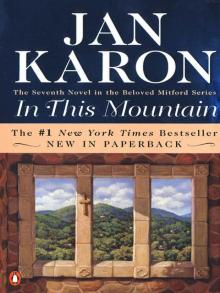 In This Mountain
In This Mountain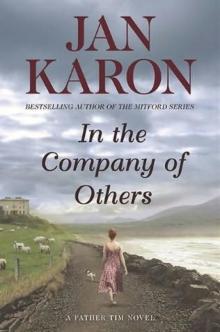 In the Company of Others
In the Company of Others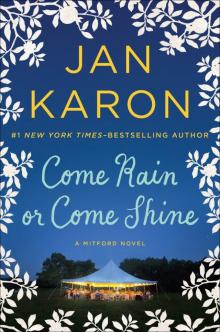 Come Rain or Come Shine
Come Rain or Come Shine To Be Where You Are
To Be Where You Are These High, Green Hills
These High, Green Hills Light From Heaven
Light From Heaven A New Song
A New Song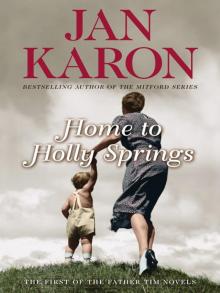 Home to Holly Springs
Home to Holly Springs The Mitford Bedside Companion
The Mitford Bedside Companion At Home in Mitford
At Home in Mitford Shepherds Abiding
Shepherds Abiding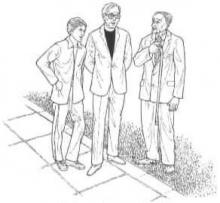 Out to Canaan
Out to Canaan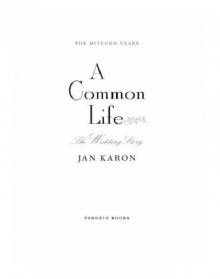 A Common Life: The Wedding Story
A Common Life: The Wedding Story Jan Karon's Mitford Years
Jan Karon's Mitford Years